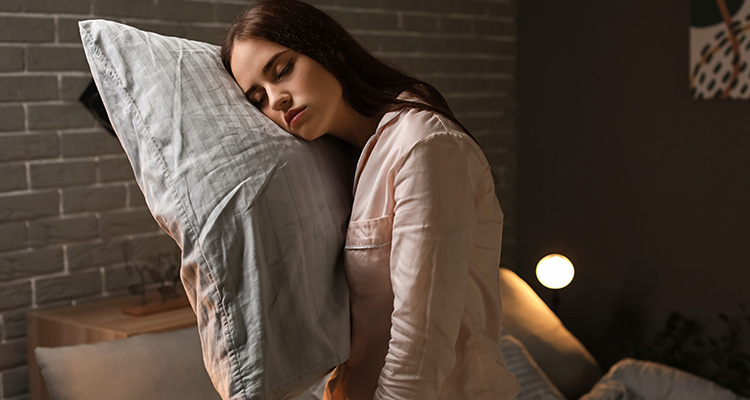Sexsomnia: What It Is and How to Cope
Sleepwalking, talking in your sleep, teeth grinding, and even night terrors are all forms of parasomnia – unusual sensations or behaviors that occur when a person is seemingly awake but actually sleeping. Sexsomnia is a rare and obscure form of parasomnia that causes the person to engage in sexual behaviors while asleep. These include attempting sex with a partner, masturbating, making sexual movements, and acts of sexual aggression. The most unsettling part is that the person usually doesn’t recall any of these behaviors once they’re fully awake, making these episodes particularly troubling for bedmates, spouses, and those around them.

Do you suspect you’re suffering from sexsomnia or perhaps someone in your life is exhibiting signs of this rare sleep disorder? If so, keep reading. In this article, we’ll take an in-depth look at sexsomnia including symptoms, treatment options, and risk factors.
Content
Sexsomnia Explained
Sexsomnia, which is also referred to as sleep sex, is a rare sleep disorder linked to the subconscious sexual behaviors mentioned above. Someone suffering from sexsomnia may engage in these sex acts while their eyes are open and they are seemingly awake. They may even speak or make sexual noises as if they’re fully conscious and aware of what’s going on when, in fact, they’re not. Not only are they unaware during an episode but they often wake with no recollection of it ever occurring.

Sexsomnia is a type of NREM (non-rapid eye movement) parasomnia most similar to sleepwalking, except the side effects, are much more serious. While some sufferers may only engage in masturbation, fondling, or making sex noises and movements, others go as far as to engage in intercourse, rape, or sexually harassing their partners.
There’s no way to gauge how many people suffer from this type of parasomnia since there are no real risk factors involved. Episodes and incidents can occur unexpectedly and are isolated from one another. Symptoms may also go unnoticed and the disorder undiagnosed if the individual lives alone. Without someone there to witness these episodes, the person affected may not even realize it’s happening. The only side effects may be waking feeling groggy and drowsy due to interrupted sleep. Once faced with the accusation of their behaviors the night before, most people become defensive and enter a state of denial. Because of this, sexsomnia can put a serious strain on intimate relationships.
One statistic related to sexsomnia was reported from a sleep center where 8% of observed patients exhibited some behaviors and symptoms associated with this condition during their sleep study. Sexsomnia can be extremely embarrassing and distressing for both the patient and their partners, roommates, or other cohabitants.
Common Symptoms Associated with Sexsomnia
Although we covered many of them already, it’s important to acknowledge all of the potential symptoms associated with sexsomnia so that you or someone you love can get the help they need. While symptoms vary from person to person, people with sexsomnia exhibit sexual behaviors while sleeping that they are unaware of and unable to control. These include:
- Masturbating
- Fondling one’s self or someone else
- Sexual movements
- Sexual noises
- Initiating sexual intercourse or other sex acts
- Sexual aggression
- Sexual assault (harassment, rape)

While there’s still a lot to learn about sexsomnia, it seems to occur more often in men than women. It can also happen in combination with other forms of parasomnia like sleep talking or sleepwalking. Men with sexsomnia often exhibit sexually aggressive behaviors, whereas, for women, masturbation is the most common symptom.
Not all signs of sexsomnia are as obvious as these. If you suspect that you or your partner are suffering from this rare parasomnia, be on the lookout for these warning signs as well.
- Uncharacteristic or unusual sexual aggression or sexual responses
- No memory of their sexual behaviors or engaging in sex acts once awake
- Difficulty waking up
- Minimal responsiveness to their environment or conversation (or complete unresponsiveness in some cases)
It’s important to note that having a “wet dream” or nocturnal emission is completely normal and healthy for both adolescent boys and some men. This occurrence is often unrelated to sexsomnia and not necessarily a sign that you were engaging in sexual behavior in your sleep. Men living alone may be concerned that they have sexsomnia following a wet dream, but there are usually other signs and symptoms present.
Triggers and Causes of Sexsomnia
Because sexsomnia can be a disturbing and troubling sleep disorder, many people wonder what causes it and how to prevent it. Unfortunately, there’s still a lot to learn about sexsomnia, which is why there are no specific or definitive causes. However, research does show that most instances of sexsomnia are diagnosed in patients with the following conditions:
- Other parasomnias (REM sleep behavior disorder, sleepwalking, etc.)
- Sleep-related seizures
- Obstructive sleep apnea (OSA)
- Restless leg syndrome (RLS)
- Narcolepsy
- Chronic insomnia
- Kleine-Levin syndrome
- Sleep-related dissociative disorder
- Persistent sexual arousal syndrome
- Nocturnal psychotic disorders
- Teeth grinding (bruxism)

Although these underlying sleep disorders may appear in combination with sexsomnia, other external factors and lifestyle choices may also trigger unwanted episodes. These include:
- Recreational drug use (past or present)
- Drinking alcohol in excess
- Sleep deprivation
- Anxiety
- Stress
- Depression
- Shift work or inconsistent sleep schedules
- Poor sleep hygiene
Triggers are not limited to this list. If you’re experiencing sexsomnia episodes, you may notice they occur following incidents or events other than those listed above. Try documenting when they occur, including the date, time, and the day’s events leading up to that night. While this is easiest if you have a sleep mate to inform you of your behavior, you can also set up a bedroom camera to monitor your sleep patterns and behaviors.
Diagnosing Sexsomnia
Once you’ve gathered enough evidence and you’re fairly confident that you’re suffering from sexsomnia, it’s important to get a medical diagnosis and advice for treatment. All too often, sexsomnia goes undiagnosed. This is usually for two reasons – first, the person is embarrassed or ashamed, or second, they have no knowledge of their outburst but simply feel tired and disoriented in the morning.

Don’t let embarrassment over your condition stop you from getting the help you need. Medical professionals and sleep specialists are trained in handling a wide range of sleep disorders, including the rare and obscure. Their main objective is to help get to the bottom of your condition by identifying the triggers and underlying causes so you can achieve quality sleep. Once you find a sleep specialist and explain your concerns, they may request a sleep study or video-polysomnography which are commonly used to diagnose sleep disorders. These tools allow the sleep specialist to observe your specific episodes and get a better understanding of your condition. Once complete, the doctor will evaluate the results and discuss potential causes or medical conditions associated with sexsomnia before suggesting a treatment plan.
Treatment for Sexsomnia
Treatment for sexsomnia comes in many forms and what works for one person may not work for another. With the help of your medical team, you can formulate a treatment plan that you’re comfortable with. While there are no current FDA-approved medications for treating sexsomnia, there are alternatives available.

Some doctors suggest certain antidepressants and sedatives may help address the symptoms of sexsomnia. By helping reduce stress and anxiety and promoting deeper sleep, some patients saw fewer outbursts and sexual episodes throughout the night. The patient is usually prescribed one medication for several months to monitor its effectiveness before committing to a treatment plan or trying a different drug.
If the doctor determines that an underlying medical condition or lifestyle choice is contributing to sexsomnia, you can explore other treatment options. For example, if you tend to have outbursts following a night of drinking alcohol or using recreational drugs, now may be the time to kick these habits and determine if they’re the trigger of your condition. If another sleep disorder is contributing to your sexsomnia episodes, you can also address this. For example, using a CPAP machine to treat sleep apnea or taking anti-anxiety medications to ease stress and help treat chronic insomnia. Treating these underlying conditions may be all the person needs to also ease symptoms associated with sexsomnia.
Another important part of treating and addressing sexsomnia is to create a safe environment for all those involved. This means the patient and anyone else in the household that’s been affected by the condition. Some sexsomnia sufferers choose to sleep in a separate bedroom as their partner, lock the door, or place alarms on the doors that keep them from exiting the room or impeding on their housemate’s personal space. When the side effects of sexsomnia include another person (fondling, initiating intercourse, or sexual harassment), it’s important to put safety measures in place. This is in the best interest of both the patient and others.
Laws and Consequences of Sexsomnia
Navigating a sexsomnia diagnosis is difficult for both the patient and those impacted by their actions. It’s unlike any other sleep disorder since many of the symptoms involved infringe on the rights and privacy of others. For example, forcing yourself on someone else sexually or sexually harassing someone are never okay and in many instances, illegal. But what happens if the person is completely unaware of their error?

These situations are usually handled on a case-by-case basis. In one study of 90 cases where the individual was accused of sexual assault, 98% of the defendants claimed amnesia or no recollection of the event as their defense. In one-third of all cases tried in the United States, there was an element of violence or aggression involved, and 14% of the cases ended in criminal charges. Today, sexsomnia is recognized as a formal psychiatric disorder and included in the DSM-5. Unfortunately, false claims of sexsomnia or using this diagnosis as an excuse for unwanted sexual advances have muddied the legal waters on more than one occasion.
Living and Coping with Sexsomnia
A sexsomnia diagnosis is not to be taken lightly and can be equally as troubling and difficult for the patient as it is for their partner. Sexsomnia sufferers often feel ashamed, embarrassed, and confused by their behavior. One reason is, that they don’t recall the events and therefore feel detached from them mentally and physically as if someone is relaying a story about someone else. Sufferers may also feel deeply ashamed since the sexual behavior they exhibit during an episode are things they would never do or say when fully awake and aware. This is especially troubling when the person initiates sex or becomes sexually aggressive with a stranger or without the other person’s consent.

The first step in coping with sexsomnia is getting an official diagnosis from a sleep specialist. If you’re involved in an intimate relationship, it’s also important to talk openly and honestly with your partner. Just as you, the patient, will have unsettled feelings about the situation, so will your significant other. Especially if your advances and episodes are directed toward them. It’s important that your partner feels safe in your presence, so until a diagnosis is made and you start treatment, you may need to make adjustments to your sleeping arrangements. Counseling is another great option for both the individual with sexsomnia and their significant other. Here, you both can express your true feelings and concerns. A therapist can help you work through your emotions together and create a safety plan that you’re both comfortable with.
Adopting a healthy sleep routine and schedule can also reduce the number of outbursts and episodes you have. Set a sleep schedule that involves going to bed at the same time each night and waking at the same time each morning. Perform relaxing behaviors before bed that help calm your mind and body like reading, taking a warm bath, or meditating. You can also create a comfortable bedroom environment that promotes sleep. Avoid using digital devices before bed, keep the room at a cool temperature, and invest in comfortable bedding, pillows, and a quality mattress. All of these lifestyle changes combined with seeing a sleep specialist and adopting a treatment plan can help both you and your loved ones cope with sexsomnia in a healthy way.
Don’t Let Sexsomnia Ruin Your Life
A sexsomnia diagnosis can be deeply disturbing, but so can leaving the condition undiagnosed and untreated. Because the effects of this sleep disorder are so troubling and could get you in legal trouble, it’s crucial that you understand the warning signs and are open to treatment. If you suspect you may have this rare sleep condition, put your pride and embarrassment aside and schedule an appointment with a sleep specialist immediately.

While there’s no cure for sexsomnia, making minor lifestyle changes and adopting healthier sleep habits can make a major improvement in both your sleep patterns and quality of life. Cognitive behavioral therapy for insomnia (CBT-i) provides a variety of techniques to help improve your relationship with sleep. Click here to learn more.
















